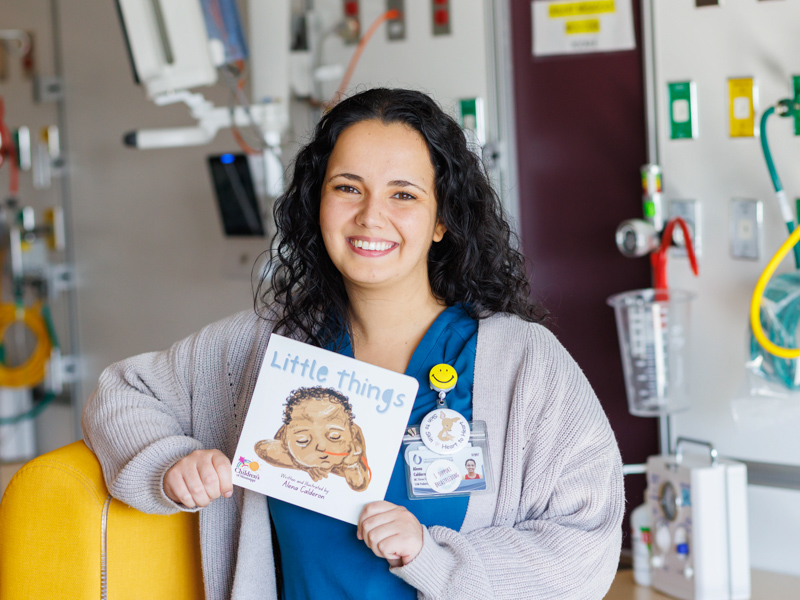Front and Center: Alena Calderon

During her Child Health and Development Promotion fellowship at the University of Mississippi Medical Center, Alena Calderon worked with babies who have been in neonatal intensive care at Children’s of Mississippi. When she needed to complete a capstone project for the fellowship, they were her inspiration.
Her project is the book “Little Things,” which she wrote and illustrated. The cardboard baby-friendly book is loaded with information and resources for families about how best to support their babies in neonatal intensive care.
“The best time to play with me is when I am in a calm, quiet, alert state,” one page reads. “Signs that I am ready include bright/focused eyes, relaxed arms and legs, calm face and a resting breathing rate.”
“I love to hear your voice as you tell me about your day,” reads another. “Reading, singing, and talking with you are my favorite ways to play.”
Activities such as talking, reading books and singing lullabies boost young babies’ language skills and help families bond with their babies, Calderon said.
"We want families of babies who are receiving care in the NICU to understand how they can best help their babies develop,” she said. “‘Little Things’ provides tips for interacting with babies in neonatal intensive care as well as developmental resources that parents can use as their children grow.”
According to Pathways.org, listed as one of the resources in “Little Things,” babies’ brains form more than a million connections per second.
“That makes the early years incredibly important in the formation of a child’s mind,” Calderon said.
A Meridian native and Mississippi State University graduate in child development, Calderon completed the CHDP fellowship in June 2023. Her work centered on Children’s of Mississippi’s Center for Advancement of Youth’s Be-HIP program, an acronym for Behavioral Health for Infants and Preschoolers.
The program seeks to expand mental and behavioral health services to children as they grow, starting with screenings for children who started life in neonatal intensive care.
"Be-HIP provides developmental and mental health assessments to children at 24 months in collaboration with our Newborn High Risk Clinic team to help monitor their development and connect them with any needed services,” Calderon said.
According to a 2017 study published in the American Psychological Association’s Psychological Bulletin, children born at less than 2 pounds, as many in the NICU are, have a greater chance of needing mental health services throughout development. Children who are identified as in need of services earlier in life and who receive treatment, the study holds, reap long-term benefits in psychological and social well-being.

Calderon was the first early interventionist in the CHDP fellowship “and really set the bar high for our expectations,” said Dr. Courtney Walker, associate professor of psychiatry and director of the program.
Funded by the U.S. Health Resources and Services Administration and the Mississippi Legislature, the fellowship is a one-year full-time position designed for postgraduates from fields including early intervention, occupational therapy, speech-language pathologists, psychology, nursing, medicine and counseling. During the program, fellows gain in-depth training for working with children birth to 5 years old.
The capstone is a required part of the training experience and can range from a research study, training initiative or a quality improvement program.
“She is an excellent early interventionist, and her idea to create a children’s book was so innovative and new…no one else had done this before,” Walker said. “The book seems so simple, but it is really brilliant in so many ways. It encourages reading but also provides guidance on how parents can read and respond to their baby’s cues, which in turn facilitates healthy attachment and promotes overall development.”
For Calderon, her capstone project combined her expertise in child development with her love of writing and drawing.
Calderon “took great care to make sure the babies depicted in the book look like our NICU babies,” Walker said. “She spent hours making sure the content was evidence-based yet accessible to all families, which is not an easy task.”
When “Little Things” was presented to the Center for Advancement of Youth team, “many were in tears because of how thoughtful and impactful it was,” Walker said. “We were even able to use some of our funds to help support printing so she could distribute it to families in the NICU. It is my hope that we/UMMC can find a way to sustain production so this book will just become part of the NICU experience for our families.”


